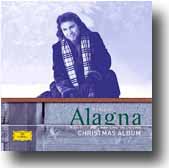REVIEW
The Christmas Album

Deutsche Grammophon 477 628-1
It's Beginning To Sound a Lot Like Christmas
Jay Nordlinger, New York Sun, 28 November 2006
Roberto Alagna: The Christmas album
Mr. Alagna, as you may well know, is a tenor born in France to Sicilian parents. He has made his album with Robin Smith, a British musician. Mr. Smith did the arrangements, and he leads the London Symphony Orchestra, plus associated forces (including no fewer than four choirs).
In a note published in the CD booklet, Mr. Alagna says that he asked himself whether he should sing his album in pop fashion or classically. He decided to do some of each. There is a great variety of songs here, sung in a variety of styles and languages.
Christmas albums are heavily dependent on arrangements if they are too vulgar, the album must fail. Mr. Smith is guilty of a bit of vulgarity. For instance, I could do without the fanfare before "Adeste fideles." But you can't please everyone, in every note, and Mr. Smith has considerable skill.
Mr. Alagna begins in a surprising and nice way with a piece that he wrote himself. Called "Gentil Père Noël," it's pleasant and catchy. The composer sings it with two sensibilities: lyrical and heroic. When he cries "Noël! Noël!" you can really feel it. And that French is marvelous and clear.
The aforementioned "Adeste fideles" "A Dusty Fiddle," in my household is a tenor anthem, the way Mr. Alagna sings it. Not bad. He then sings in English "We Wish You a Merry Christmas" and charmingly. A children's chorus chirps with him.
"Silent Night" is present and accounted for, sung in three verses, and three languages: French, German, and English. Next we get a Romanian carol, suggested to Mr. Alagna by his wife, the soprano Angela Gheorghiu.
"Il est né, le divin Enfant" is the province of every French singer, and Mr. Alagna takes care to include it. I don't know what to think of the primitive drumming in Mr. Smith's arrangement, but it's interesting. The biggest French carol of all "Cantique de Noël," or "O Holy Night" is present too, and Mr. Alagna sings it rather more lustily than angelically: but it's not ineffective.
He sings Schubert's "Ave Maria" like a pop song. Why, I don't know, given that it's a classic lied. "Jingle Bells" is very corny and very appealing. Tell me now, did you ever think you'd hear Roberto Alagna singing "Jingle Bells"? He also sings "The First Nowell," with gulps and scoops. It's not especially elegant, but it works, somehow.
There is a new piece here besides Mr. Alagna's composed expressly for this album: "The Love of a Child," by Russ Ballard and Chris Winter. The liner notes call it a "beautiful, timeless classic" couldn't they have waited a few weeks before declaring it that? I'm not sure this song will last beyond New Year's.
The main interest of "Guardian Angels" is that it was co-written by Harpo Marx, the distinguished harpist. (With his brothers, he also worked in comedy.) I had a sweet and nostalgic moment when the needle reached "Mille cherubini in coro": I heard another tenor, Carlo Bergonzi, sing it years ago.
On the penultimate track, Mr. Smith gives us a mad arrangement of "God Rest Ye Merry, Gentlemen" one of the most mispunctuated titles in history but it is curiously fascinating. And Mr. Alagna ends with "White Christmas," which he sings in the feyest, weirdest voice in the history of the world. He sounds like Truman Capote, if Capote sang. Mr. Smith's arrangement is as strange as the singer's performance.
But I enjoyed this album, for all its peculiarity. It has sincerity, verve, and a Christmas spirit. A listener could do worse.
This page was last updated on: December 3, 2006